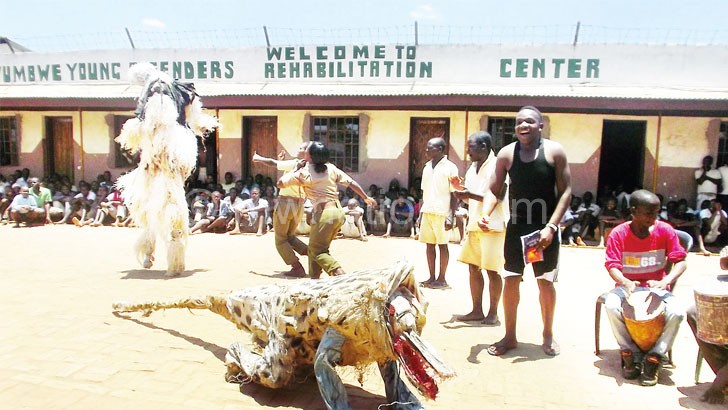Dancing to change
If you go to Bvumbwe Juvenile Prison in Thyolo, you will find crocodiles in the corridors and grounds of the cooler moving. In all probability you will think that the crocodiles have escaped from nearby rivers to devour the inmates.
But, that thinking will be untrue as the inmates at the cooler are in forefront in cultural preservation especially in music and traditional dances.

Crocodiles are the ingredients of the gule wamkulu dance to make it appetising and delicious to watch.
Convicted some years ago, Amos Chikoko described traditional dances at the prison as crucial in inmates’ reformation.
He said apart from the entertainment they get from the dances the messages that constitute the dances are critical in their rehabilitation.
He cited an example that most songs comprise messages on how one commits a crime, the challenges he or she faces when jailed as well as give solutions on how one can survive behind the bars and beyond.
“I remember in my first days I used to worry and spent most of my days crying as depression haunted me day and night since there was nothing to motivate me. However, the introduction of traditional dances here soothed my soul and enabled me to start coping with life here,” he said.
Another juvenile Steven Lino described traditional dances as foreign currency earner if done on a large scale. He cited an example that when they (juveniles) perform traditional dances during several events organised by various organisations in the cooler the patrons honour them with some cash.
“We are optimistic that the cash and kind awards we collect from the audience that watches us performing can transform the socio-economic status of the country if traditional dances are prioritised in the country and exported to other countries,” he observed.
Chikondi Chikalima the juvenile who believes that every person has the responsibility in cultural preservation urges people to develop interest in preserving Malawian cultures regardless of their cultural backgrounds.
“It is important to learn and practice more cultural practices especially those people who visit other countries to showcase them to other people in the countries they are visiting,” he said.
Patron for traditional dances at the cooler warder Watson Chiotcha described traditional dances as a concoction of uprooting depression, misery as well stigma among the inmates.
He stated that the dances bring the inmates together to share their experiences and compose songs in accordance to their discussions.
However, he bemoaned lack of costumes, drums and other 2016
incentives as major setbacks that derail the thrilling of traditional dances in the cooler. He stated that if prisons are equipped with adequate resources can transform into habitats of cultural preservation.
He called on government and non-governmental organisations as well as other stakeholders interested in cultural preservation to promote traditional dances behind the bars with various resources and skills.
“Our objective is to rehabilitate these juveniles holistically by inducing in them morals through these traditional dances that will enable them to become responsible citizens of the country after completing their sentences,” he said.n





